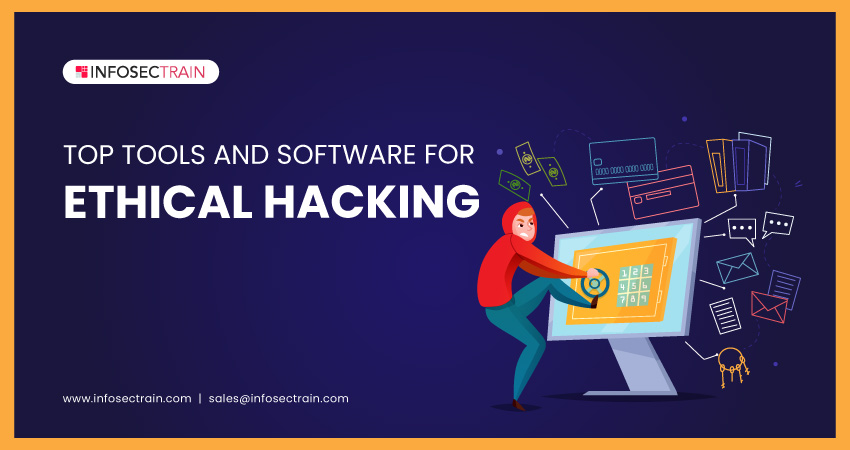Top Tools and Software for Ethical Hacking
As technology advances, the type of cybersecurity threats evolves as well. Security measures alone will not be enough in the face of these emerging threats. As a result, ethical hacking is an essential aspect of a company’s security strategy. Ethical Hackers apply their expertise to help firms secure and improve their systems. They have been granted permission to hack into an organization’s network in order to conduct testing to ensure that it is secured against criminal hacking. They provide a critical service to the companies by checking for security vulnerabilities that could lead to a data breach and reporting the organization’s found vulnerabilities.

With the introduction of automated techniques, the world of ethical hacking has changed dramatically in terms of finding and exploiting vulnerabilities in IT systems, web applications, servers, and networks. Depending on the systems they were built to access, these tools have varied capabilities.
In this article, we will discuss popular ethical hacking tools and software used today.
Ethical Hacking Tools and Software:
- Wireshark: Wireshark is an open-source real-time network protocol analyzer that is available for free on the internet. It is used to capture traffic from the network, and it has a high success rate in detecting and resolving network security vulnerabilities due to its capacity to responsibly search for and fix problems. It gives you a precise view of what is going on in your network. Therefore, it is popular among Ethical Hackers and Penetration Testers. They can grasp the problems it retrieves from the network since it displays them in a way that is easy to read. Therefore, it is quite beneficial to obtain any network vulnerability.
- Nmap: Nmap lets you scan your network for everything connected to it and a wealth of information about what is connected, what services each host is providing, and so on. Nmap began as a command-line tool, but it was later adapted for Linux or Unix-based operating systems, and a Windows version is now available. It supports many scanning methods, including UDP, TCP connect (), and TCP SYN (half-open). It is the best hacking tool ever used in port scanning, which is one of the steps in ethical hacking. Nmap may be used by cybersecurity specialists to analyze networks, monitor host and service uptime, and manage service upgrade schedules.
- Metasploit: Metasploit is the world’s most popular open-source penetrating framework, which security professionals utilize as a penetration testing or ethical hacking system and a development platform for creating cybersecurity tools and exploits. For both attackers and defenders, the framework makes hacking straightforward. The Metasploit Framework is a Ruby-based, modular penetration testing platform that lets you build, test, and exploit code. It also comes with tools for testing security vulnerabilities, enumerating networks, executing attacks, and avoiding detection.
- Nikto: Nikto is a free Perl-based command-line vulnerability scanner that looks for malicious files/CGIs, obsolete server software, and other issues on web servers. It checks for both general and server-specific issues, and it also records and publishes any cookies that are delivered.
- John the Ripper: John the Ripper is a free and open-source password cracker software that demonstrates its intelligence as a tool that can intelligently crack passwords. If you are concerned about ensuring the security of a password, then John the Ripper can assist you. It is a popular and valuable tool for determining the strength of a password and can assist IT personnel in identifying weak passwords and password policies, and it excels in this area. It can modify the algorithm of any password by recognizing the nature of encryption used for passwords in the auto-detecting mode.
- Aircrack-ng: Aircrack-ng is an extensive set of tools for evaluating WiFi network security, with an emphasis on various aspects of WiFi security. It is a collection of tools for spotting flaws in WiFi networks. It may be used to monitor WiFi security, record data packets, and export them to text files for further analysis. It can be used to capture and inject WiFi cards to verify their performance.
- Nessus: Nessus is a remote security scanning tool that examines a computer and alerts you if it finds any vulnerabilities that malevolent hackers could exploit to obtain access to any computer on your network. Ethical Hackers can use Nessus to quickly and accurately find vulnerabilities, configuration errors, and malware in physical, virtual, and cloud systems.
- Acunetix: Acunetix is a web vulnerability scanner that provides a 360-degree view of a company’s security. It is an automated web application security testing tool that examines your online applications for vulnerabilities such as SQL injection, Cross-Site Scripting, and other exploitable flaws.
- Kismet: Kismet is a robust wireless sniffer tool included with Kali Linux. For 802.11 wireless LANs, it is a network detector, packet sniffer, and intrusion detection system. It is one of the greatest ethical hacking tools for testing wireless networks and WLAN (Wireless LAN) hacking.
- Burp Suite: Burp Suite is a graphical tool and integrated platform for performing web application security testing preferred by security specialists all across the world. Its numerous tools collaborate to assist the full testing process, from mapping and analyzing an application’s attack surface to detecting and exploiting security vulnerabilities.
- Hashcat: Hashcat is a password cracking tool that helps with brute-force attacks by using hash values of passwords that the tool is guessing or applying. It can be used for both ethical as well as unethical hacking, and it is intended to crack even the most complicated password representations.
Wrap Up:
The tools and softwares mentioned above are some of the most commonly used in ethical hacking. The ethical hacking procedure will be slow and time-consuming without automated tools. So, if you desire to learn how to be an effective Ethical Hacker, InfosecTrain can assist you. Enroll in one of our cybersecurity training courses to learn more about these tools and software, as well as a few other ethical hacking tools and software, and how to utilize them.
Some of the courses you might consider are:
- Certified Ethical Hacker (CEH)
- CompTIA PenTest+
- Pentester combo training course
- Information Security Analyst training course
- SOC Expert combo training course
We also offer various security testing courses.






 1800-843-7890 (India)
1800-843-7890 (India)